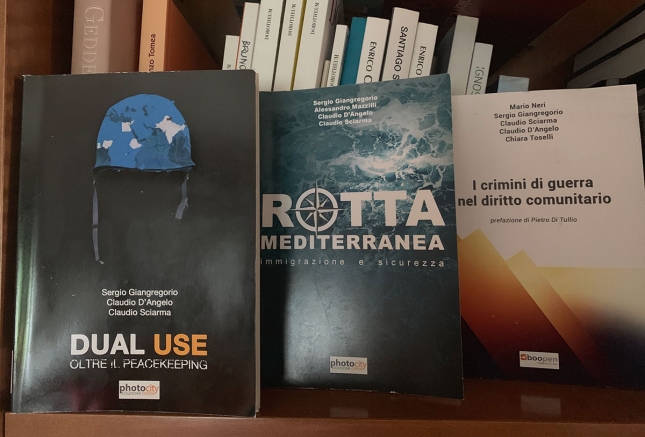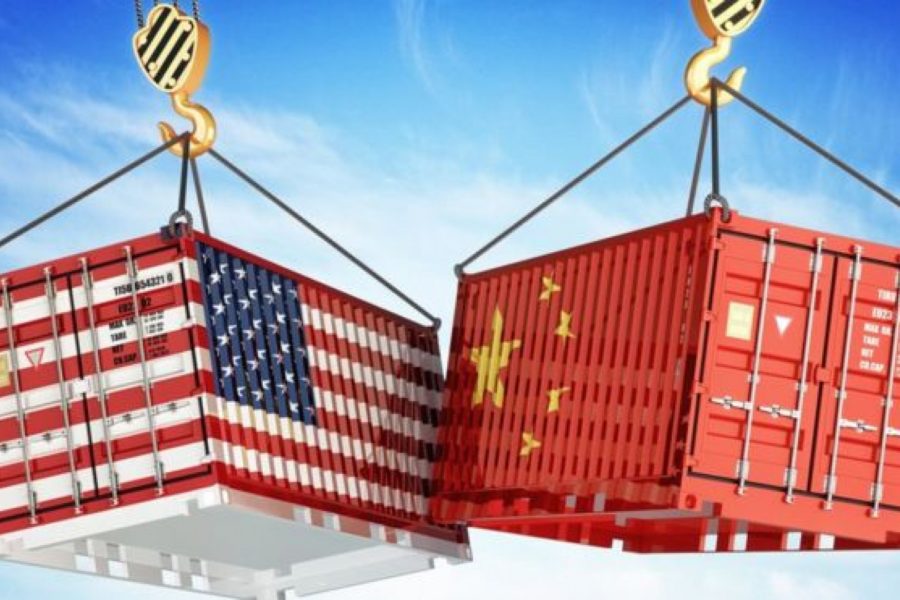They are not born to be so, but I want to think that “Mediterranean Route – immigration and security”, “Dual Use – beyond Peacekeeping” and “War crimes in Community law” constitute a unique triology in its genre, based on disclosure aimed at building knowledge. The authors are different and, although indent of different issues, appear to be united by being patently professionals in their areas of competence. It is easy to identify a main and well-established nucleus, which is composed by Sergio Giangregorio, Claudio D’Angelo and Claudio Sciarma, around which satellites go, which respond to the name of Alessandro Mazzilli for “Rotta Mediterranea” and Mario Neri and Chiara Toselli for “War crimes in EU law”, equally fundamentals for the completeness of the discussion .
First of all, it is necessary to understand which topics deal with the aforementioned works. In carrying out this analysis, I will start from the less recent text.
So let’s start with “Dual Use – beyond peacekeeping”, which was printed in 2014. Although five years have passed, which for the topics covered by the authors can result a much larger period , the text is still current. Right from the start, I found really interesting the words of Sergio Giangregorio in the Self-portrait section, which turns out to be a sort of pre-preface to what is actually the opening of the book, by Omar Abdullah Rashid. I Consider the Giangregorio’s reflexion not only a nice summary of what we are about to read, but also the situation of contemporary society. What emerges, since a first reading of the index, is the will of the authors to take the reader by the hand, who is not necessarily required to be an expert, on the contrary: I find that this writing is much more effective for those who, like me, he knows little about the subject, but wants to get informed. During reading it is easy to see how the “stakes” are always higher and the events increasingly intricate, even if always explained with a popular character that does not exclude a fluid and clear writing, an essential element in my opinion to open the reading field to as many readers as possible. What I appreciated most in this book is the sensitivity, treated however with extreme objectivity, of particularly delicate and, alas, little known elements: I refer blatantly to the treatment of what is Post-Traumatic Stress Disorder, situation in front which very often we tend to close our eyes and situation that tends even today to underestimate. The reference to real peacekeeping missions is also very important , which becomes important for having a pragmatic picture of the situation. However, the authors did not limit themselves to outlining the situation, in fact, they did much more: after explaining the problems and the forces involved, they proposed concrete solutions to solve this type of discomfort. Why is “Dual Use” a text to read? Because:
“it is a text that falls fully within the ambitious work of deepening and awareness that we are clamoring for in a medical field, it is a look at the future, an inspiring push”
Ivan Kornilov
We come now to “Mediterranean Route – immigration and security”, printed in 2017. From the outset, I feel obliged to say that I appreciated this text for the authors’ ability not to fit into the political brawls of recent years; It will seem a banality, but it is not: a text is scientific when it is objective and I believe it is really difficult not to be overwhelmed by a political vein when it comes to certain subjects, yet Giangregorio, Mazzilli, D’Angelo and Sciarma have succeeded, ensuring that the text has gained further credibility. The chapters in this case are six, along which the scheme already proposed, and well thought out, of the work of which I spoke above is taken up again: from the general one goes to the particular, giving the bases, framing the situation and proposing concrete solutions. The geographical limits of this text see those of Europe where, inevitably, the Mediterranean plays a central role, “the sea of hope and often of death”, as Amer al Sabaileh writes in the Preface. It is precisely to the Mediterranean, a fundamental geopolitical scenario, that the second chapter is dedicated, which I found to be the most complete, along with the fourth chapter, rich and perhaps a little complicated for those who are at the “first weapons” with these reasonings .
Also in this case, I appreciated the extreme clarity of the language, which is reinforced by specific terminologies and which is completed by visual representations, such as graphs, tables and maps, which are an element added to the narration of the events.
We come to the last text of our trilogy: “War crimes in EU law”, published in 2019 and with a preface by Pietro di Tullio, President of the European Confederation of Managers’ Units. I must say that, among the three, I found this text to be the most challenging (and that is by no means a criticism), because it is the result of an important interpenetration of several thematic areas; there is not only geopolitics, but there is also the right, not at all taken for granted in such operations. The work is presented as a long treatise well amalgamated among the aforementioned sectors, in which the ability of the authors can be seen in having been able to not let the thematic areas override each other, indeed: the various hands they are difficult to identify and the textual unit has certainly helped. As already expressed above, those who want to face reading this text must be ready to do a good job of self-information, although I must say that footnotes often help in topics where it is perhaps difficult to be too knowledgeable. But it must also be said that this is the purpose of these texts: to promote a self-information that enriches our cultural background, thanks to which we will certainly be ready to face the current episodes with more awareness and knowledge. This is what gave me the reading of these books: knowing how to juggle ample and important thematic areas, but also knowing how to analyze situations with extreme objectivity and clarity.
If I had to locate the fil rouge that exists between these texts, which at a first glance have little in common , if not the authors and geopolitical trend, is that there is a bias, I would call inherent and innate, in wanting to unfold cause and effect , with the sole purpose of being able to improve the society in which we live, starting from our readers, that we have the duty first of all to inform us and in secundis to make us an active and integral part .





